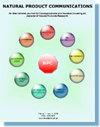龙脑提取物通过调节 2K1C 大鼠体内 miRNA 与肠道微生物群之间的相互作用改善高血压状况
IF 1.4
4区 医学
Q4 CHEMISTRY, MEDICINAL
引用次数: 0
摘要
目的:研究Dracocephalum moldavica L.提取物(DME)对高血压的治疗作用,并阐明其分子机制。方法:采用双肾单夹(2K)模型:在雄性Wistar大鼠体内建立双肾单夹(2K1C)模型,通过口腔灌胃给药DME或生理盐水,持续4周。随后监测血压。通过 miRNA 测序、16S rRNA 基因测序和血清代谢组学分析,分别对粪便微RNA(miRNA)、肠道微生物和宿主代谢物进行了评估。结果显示服用二甲亚硝胺可减轻2K1C诱导的大鼠高血压。此外,DME还缓解了2K1C大鼠体内miRNA表达失调和肠道微生物群失调。相关性分析证实了差异表达的 miRNA 与肠道微生物之间的联系。此外,非靶向代谢组学分析显示,与对照组大鼠相比,2K1C 大鼠血清中的代谢谱有所不同。有趣的是,这些血清代谢物的变化在一定程度上被二甲亚硝胺所减弱。代谢物富集分析表明,差异表达的代谢物主要涉及三个代谢途径(花生四烯酸代谢、TCA 循环以及丙氨酸、天门冬氨酸和谷氨酸代谢)。结论通过调节 miRNA、肠道微生物群和宿主代谢物,DME 可作为预防高血压的有效干预措施。我们的研究结果可为高血压的治疗提供新的见解。本文章由计算机程序翻译,如有差异,请以英文原文为准。
Dracocephalum moldavica L. Extract Ameliorates Hypertension Through Modulating the Interaction Between miRNAs and Gut Microbiota in 2K1C Rats
Aim: To investigate the therapeutic effects of Dracocephalum moldavica L. extract (DME) against hypertension and elucidate the underlying molecular mechanism. Method: A two-kidney one-clip (2K1C) model was established in male Wistar rats, and DME or saline was administered via oral gavage for 4 weeks. Subsequently, the blood pressure was monitored. Fecal microRNAs (miRNAs), gut microbes, and host metabolites were evaluated through miRNA sequencing, 16S rRNA gene sequencing, and serum metabolomics analysis, respectively. Results: DME administration attenuated 2K1C-induced hypertension in rats. Additionally, DME alleviated the dysregulation of miRNA expression and gut microbiota dysbiosis in 2K1C rats. The correlation analysis confirmed the association of the differentially expressed miRNAs with gut microbes. Furthermore, non-targeted metabolomics analysis revealed different metabolic profiles in the serum of 2K1C rats compared to control rats. Interestingly, the changes in those serum metabolites were partially attenuated by DME. The metabolite enrichment analysis demonstrated that the differentially expressed metabolites were mainly involved in three metabolic pathways (Arachidonic acid metabolism, TCA cycle, and Alanine, aspartate and glutamate metabolism). Conclusion: DME can be suggested as an effective intervention in the prevention of hypertension through modulating the miRNAs, gut microbiota, and host metabolites. Our findings may give new insights regarding the treatment of hypertension.
求助全文
通过发布文献求助,成功后即可免费获取论文全文。
去求助
来源期刊

Natural Product Communications
工程技术-食品科技
CiteScore
3.10
自引率
11.10%
发文量
254
审稿时长
2.7 months
期刊介绍:
Natural Product Communications is a peer reviewed, open access journal studying all aspects of natural products, including isolation, characterization, spectroscopic properties, biological activities, synthesis, structure-activity, biotransformation, biosynthesis, tissue culture and fermentation. It covers the full breadth of chemistry, biochemistry, biotechnology, pharmacology, and chemical ecology of natural products.
Natural Product Communications is a peer reviewed, open access journal studying all aspects of natural products, including isolation, characterization, spectroscopic properties, biological activities, synthesis, structure-activity, biotransformation, biosynthesis, tissue culture and fermentation. It covers the full breadth of chemistry, biochemistry, biotechnology, pharmacology, and chemical ecology of natural products.
Natural Product Communications is a peer reviewed, open access journal studying all aspects of natural products, including isolation, characterization, spectroscopic properties, biological activities, synthesis, structure-activity, biotransformation, biosynthesis, tissue culture and fermentation. It covers the full breadth of chemistry, biochemistry, biotechnology, pharmacology, and chemical ecology of natural products.
 求助内容:
求助内容: 应助结果提醒方式:
应助结果提醒方式:


